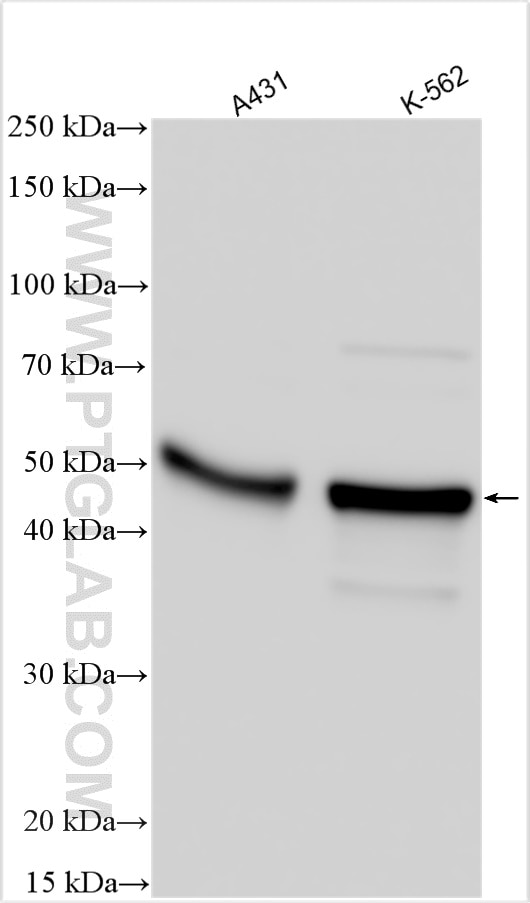Tested Applications
| Positive WB detected in | A431 cells, K-562 cells |
Recommended dilution
| Application | Dilution |
|---|---|
| Western Blot (WB) | WB : 1:2000-1:12000 |
| It is recommended that this reagent should be titrated in each testing system to obtain optimal results. | |
| Sample-dependent, Check data in validation data gallery. | |
Published Applications
| WB | See 1 publications below |
Product Information
24433-1-AP targets LYAR in WB, ELISA applications and shows reactivity with human, mouse samples.
| Tested Reactivity | human, mouse |
| Cited Reactivity | human |
| Host / Isotype | Rabbit / IgG |
| Class | Polyclonal |
| Type | Antibody |
| Immunogen | LYAR fusion protein Ag19599 Predict reactive species |
| Full Name | Ly1 antibody reactive homolog (mouse) |
| Calculated Molecular Weight | 379 aa, 44 kDa |
| Observed Molecular Weight | 44 kDa |
| GenBank Accession Number | BC015796 |
| Gene Symbol | LYAR |
| Gene ID (NCBI) | 55646 |
| RRID | AB_2879547 |
| Conjugate | Unconjugated |
| Form | Liquid |
| Purification Method | Antigen affinity purification |
| UNIPROT ID | Q9NX58 |
| Storage Buffer | PBS with 0.02% sodium azide and 50% glycerol pH 7.3. |
| Storage Conditions | Store at -20°C. Stable for one year after shipment. Aliquoting is unnecessary for -20oC storage. 20ul sizes contain 0.1% BSA. |
Background Information
LYAR, also named as ZLYAR, is 379 amino acid protein, which contains 2 C2H2-type zinc fingers. LYAR is expressed at at high levels in immature spermatocytes, early embryos and in fetal liver and thymus ,with low expression in kidney and spleen. It is suggested that LYAR participates in regulating the stability of C23, a protein that is critical for maintaining the self-renewal and differentiation of embryonic stem cells.
Protocols
| Product Specific Protocols | |
|---|---|
| WB protocol for LYAR antibody 24433-1-AP | Download protocol |
| Standard Protocols | |
|---|---|
| Click here to view our Standard Protocols |
Publications
| Species | Application | Title |
|---|---|---|
Cell Chem Biol Novel RNA-Affinity Proteogenomics Dissects Tumor Heterogeneity for Revealing Personalized Markers in Precision Prognosis of Cancer. |



